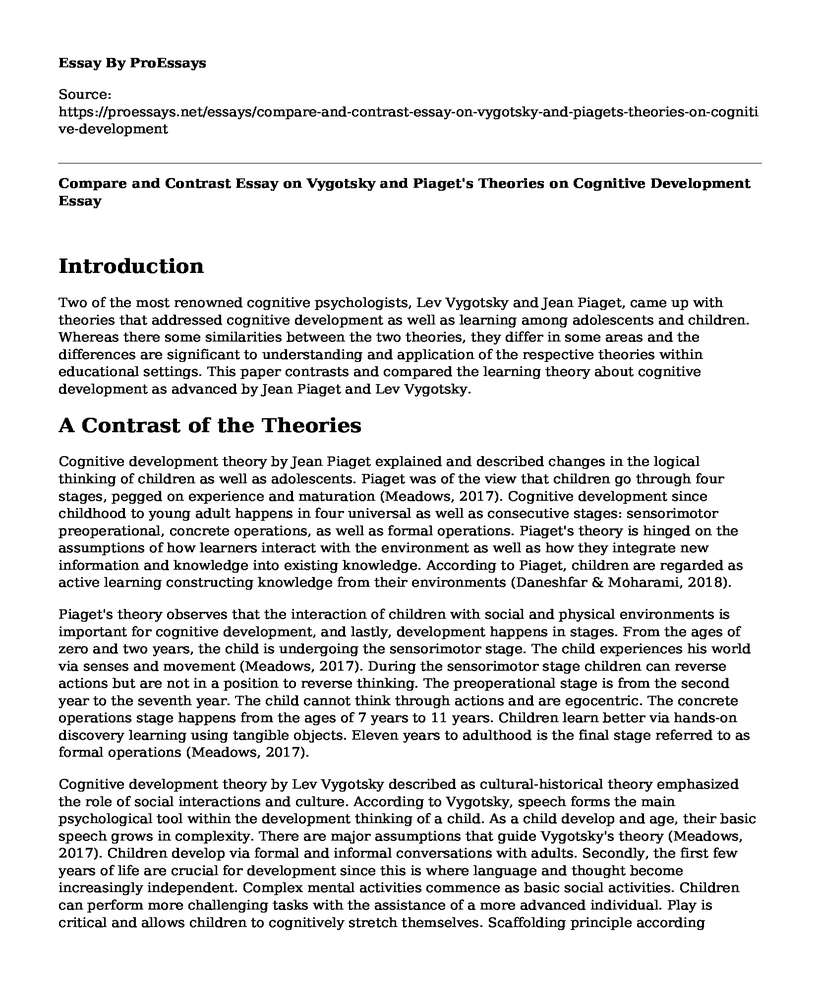Introduction
Two of the most renowned cognitive psychologists, Lev Vygotsky and Jean Piaget, came up with theories that addressed cognitive development as well as learning among adolescents and children. Whereas there some similarities between the two theories, they differ in some areas and the differences are significant to understanding and application of the respective theories within educational settings. This paper contrasts and compared the learning theory about cognitive development as advanced by Jean Piaget and Lev Vygotsky.
A Contrast of the Theories
Cognitive development theory by Jean Piaget explained and described changes in the logical thinking of children as well as adolescents. Piaget was of the view that children go through four stages, pegged on experience and maturation (Meadows, 2017). Cognitive development since childhood to young adult happens in four universal as well as consecutive stages: sensorimotor preoperational, concrete operations, as well as formal operations. Piaget's theory is hinged on the assumptions of how learners interact with the environment as well as how they integrate new information and knowledge into existing knowledge. According to Piaget, children are regarded as active learning constructing knowledge from their environments (Daneshfar & Moharami, 2018).
Piaget's theory observes that the interaction of children with social and physical environments is important for cognitive development, and lastly, development happens in stages. From the ages of zero and two years, the child is undergoing the sensorimotor stage. The child experiences his world via senses and movement (Meadows, 2017). During the sensorimotor stage children can reverse actions but are not in a position to reverse thinking. The preoperational stage is from the second year to the seventh year. The child cannot think through actions and are egocentric. The concrete operations stage happens from the ages of 7 years to 11 years. Children learn better via hands-on discovery learning using tangible objects. Eleven years to adulthood is the final stage referred to as formal operations (Meadows, 2017).
Cognitive development theory by Lev Vygotsky described as cultural-historical theory emphasized the role of social interactions and culture. According to Vygotsky, speech forms the main psychological tool within the development thinking of a child. As a child develop and age, their basic speech grows in complexity. There are major assumptions that guide Vygotsky's theory (Meadows, 2017). Children develop via formal and informal conversations with adults. Secondly, the first few years of life are crucial for development since this is where language and thought become increasingly independent. Complex mental activities commence as basic social activities. Children can perform more challenging tasks with the assistance of a more advanced individual. Play is critical and allows children to cognitively stretch themselves. Scaffolding principle according Vygotsky involved giving learners clues or hints for problem-solving for the learner to better approach the issue in future (Daneshfar & Moharami, 2018).
Similarities between the Theories
Both Vygotsky and Piaget agree that development happens by the fact that the child is an active learner. The two scholars believe that the child has to actively organize new information with current information to achieve an equilibrium state. According to Vygotsky, children offer feedback to the teacher or adult concerning their level of understanding. Piaget and Vygotsky believe that development usually declines with age. Vygotsky and Piaget both agree that children do not just absorb experiences (Meadows, 2017).
Conclusion
To conclude, the approaches and methods of teaching have to a large extent been influenced by the research of Lev Vygotsky and Jean Piaget. The two cognitive psychologists have contributed immensely to the field of education by offering explanations for cognitive learning styles and abilities in children. Whereas the psychologists may differ on how they perceive cognitive development within children, both provide educators with good suggestions on teaching various materials in a developmentally suitable way.
References
Daneshfar, S., & Moharami, M. (2018). Dynamic assessment in Vygotsky's sociocultural theory: origins and main concepts. Journal of Language Teaching and Research, 9(3), 600-607.
Meadows, S. (2017). An assessment of Piaget's theory of cognitive development. In Developing Thinking (pp. 7-25). Routledge.
Cite this page
Compare and Contrast Essay on Vygotsky and Piaget's Theories on Cognitive Development. (2023, Mar 14). Retrieved from https://proessays.net/essays/compare-and-contrast-essay-on-vygotsky-and-piagets-theories-on-cognitive-development
If you are the original author of this essay and no longer wish to have it published on the ProEssays website, please click below to request its removal:
- Dissociative Identity Disease (DID) Essay
- Cognitive Behavior Therapy in Social Work Essay
- Stress Management Annotated Bibliography
- Essay on Exploring Vicarious Trauma and Intersectionality in Trauma Work
- Essay Example on Anxiety Diagnosis: Features & History to Elicit
- ISTJ: Introverted Thinkers With a Keen Sense of Duty - Essay Sample
- Depression in Young Adolescents: High Prevalence, High Risk - Research Proposal







